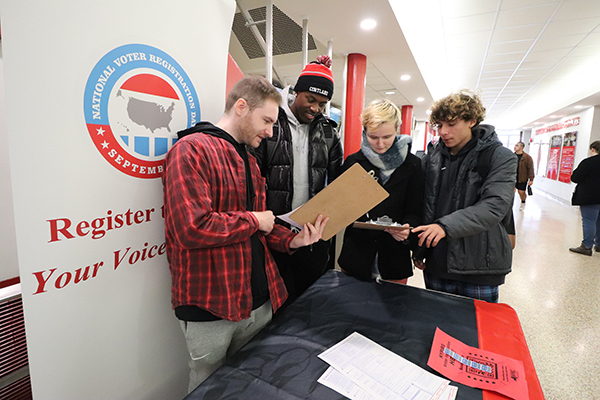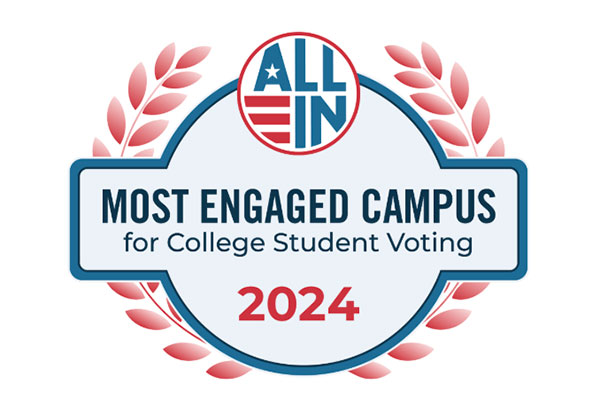
11/19/2024
SUNY Cortland was nationally recognized this month as a 2024 All In Most Engaged Campus for College Student Voting.
The All In Campus Democracy Challenge, a national program promoting college voter registration and turnout efforts, strives to strengthen civic culture by institutionalizing democratic engagement activities and programs on college campuses, making voter participation a defining feature of campus life.
All In, which currently works to engage with more than 10 million students on more than 1,000 campuses nationwide, is an initiative of Civic Nation, a 501(c)(3) nonprofit.
This national voter engagement recognition, Cortland’s second since April, spotlights colleges and universities that take concrete actions to increase student voter participation. SUNY Cortland joins a group of 471 colleges and universities recognized for their 2022 accomplishments by the nonpartisan group, which is based in Washington, D.C.
The Most Engaged Campus for College Student Voting challenge placed SUNY Cortland among 471 colleges and universities for their outstanding efforts to increase nonpartisan student voter participation. The institutions completed four core actions to earn their rankings:
- Participating in the All In Campus Democracy Challenge
- Sharing 2022 National Study of Learning, Voting and Engagement (NSLVE) Reports containing campus voting data with All In
- Developing and submitting a 2024 democratic engagement action plan with All In
- Having a current signatory to All In’s Higher Education Presidents’ Commitment to Full Student Voter Participation
The university previously earned the Most Engaged Campus for College Student Voting honor in November 2022 for its 2020 actions.
Registering students to vote continues to be a priority on the Cortland campus, with 777 students newly registered for the 2023 election and 830 new voters registered for 2024, according to John Suarez, who directs SUNY Cortland’s Barbara A. Galpin ’68, M ’74 Institute for Civic Engagement, and Jack Byrd, coordinator for the Cortland chapter of New York Public Interest Research Group (NYPIRG).
However, Suarez and others in the campus community don’t believe that registering lots of students to vote is enough to motivate students to be fully engaged in the running of government. They’re working on that.
“This second All In Most Engaged Campus for College Student Voting recognition is important because it recognizes SUNY Cortland’s ‘all hands on deck’ approach to helping students practice ways of being more engaged in public life,” Suarez said.
SUNY Cortland and other campuses are participating in a higher education shift described in the online publication EdSurge, “In Time of Campus Turmoil, More Colleges Try Teaching Civil Discourse.”
“We’re working to help students understand that while voting is one way to be involved in civic decision-making, there are many ways to be involved in between elections,” he said.
For example, the Galpin Institute partners with three Student Government Association (SGA) clubs to conduct deliberative dialogues, in which 30 to 40 students with different points of view explore options for addressing a shared concern. In addition to students, participants often include faculty, staff, administrators and local elected officials. Students practice constructive disagreement and problem solving skills, which strengthen their civic and career readiness.
In another example, those three clubs, BridgeCortland, the local chapter of Bridge USA, Turning Point USA/Cortland, and the Cortland chapter of NYPIRG organized presidential and vice-presidential debate watch parties. The League of Women Voters/Cortland County and Cortland Auxiliary Services contributed to the events as well, with Election Bingo cards and prizes.
Meanwhile, the Galpin Institute’s Cortland Applied Learning Practitioners/Democracy Engagement Fellows program supports the efforts of individual faculty members to incorporate civic discourse skills into applied learning courses in a specific discipline.
“Again, this helps students understand that they can apply their education in civic decision-making activities that go beyond voting in elections,” Suarez said.
This past spring, the university was among 93 institutions of higher education in the U.S. that the All In Campus Democracy Challenge recognized for action plans promoting student participation in elections with a Highly Established Action Plan Seal. The university first won this honor in 2022. The Challenge considered 932 action plan participants, each of which submitted a detailed outline of how it will reach its voter registration and turnout goals. Only two other SUNY institutions made the 2024 “highly established action plan” list.
Jennifer Domagal-Goldman, executive director of the All In Campus Democracy Challenge, noted that the research is clear.
“Colleges and universities that make intentional efforts to increase nonpartisan democratic engagement have higher campus voter registration and voter turnout rates,” she said.
“This year we saw more colleges than ever before step up their efforts to ensure that their students were registered and ready to make their voices heard at the ballot box. These Most Engaged Campuses are setting the standard for nonpartisan civic engagement work for colleges and universities across the country.”
